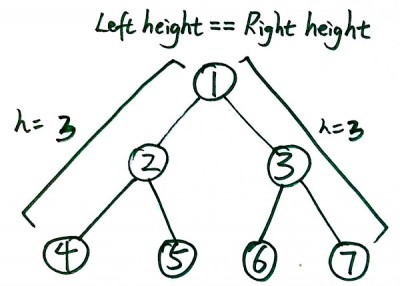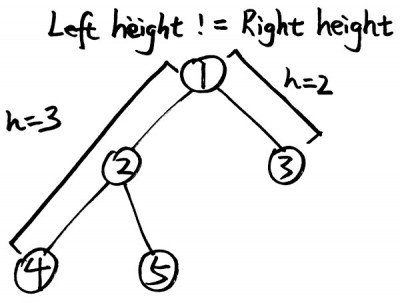Given a complete binary tree, count the number of nodes.
The solution to this problem can be as simple as the following:
public int countNodes(TreeNode root) { if(root == null){ return 0; } return 1 + countNodes(root.left) + countNodes(root.right); } |
The following two solutions are improvements to this solution. The idea is that we can skip some elements to reduce time in the average case.
Java Solution 1
Steps to solve this problem:
1) get the height of left-most part
2) get the height of right-most part
3) when they are equal, the # of nodes = 2^h -1
4) when they are not equal, recursively get # of nodes from left&right sub-trees


public int countNodes(TreeNode root) { if(root==null) return 0; int left = getLeftHeight(root)+1; int right = getRightHeight(root)+1; if(left==right){ return (2<<(left-1))-1; }else{ return countNodes(root.left)+countNodes(root.right)+1; } } public int getLeftHeight(TreeNode n){ if(n==null) return 0; int height=0; while(n.left!=null){ height++; n = n.left; } return height; } public int getRightHeight(TreeNode n){ if(n==null) return 0; int height=0; while(n.right!=null){ height++; n = n.right; } return height; } |
Each time, you will have to do traversals along the left and right edges. At level h, you iterate zero times (no child). At level h – 1, you iterate once (one child). And so on. So that is 0 + 1 + 2 + … + h steps just to compute the left edges, which is h(1 + h)/2 = O(h^2).
The countNodes part has f(n) = 2 * 2 …* 2 = 2^h which is the number of nodes. Therefore, the time complexity is bounded by O(n) where n is the number of nodes in the tree.
Java Solution 2
public int countNodes(TreeNode root) { int h = getHeight(root); int total = (int)Math.pow(2, h)-1; //get num missed int[] miss = new int[1]; helper(root, 0, h, miss); return total - miss[0]; } //true continue, false stop private boolean helper(TreeNode t, int level, int height, int[] miss){ if(t!=null){ level++; }else{ return true; } if(level >=height){ return false; } if(level == height-1){ if(t.right == null){ miss[0]++; } if(t.left == null){ miss[0]++; } if(t.left!=null){ return false; } } boolean r = helper(t.right, level, height, miss); if(r){ boolean l = helper(t.left, level, height, miss); return l; } return true; } private int getHeight(TreeNode root){ TreeNode p = root; int h = 0; while(p!=null){ h++; p = p.left; } return h; } |
The sum of total node can also be written as:
int total = (2 << (h-1)) - 1; |
Average time complexity is O(n/2), which is half of the number of nodes in the tree.
recursive approach, may be it is expensive though but very easy and straight forward:
it fails the online test saying time limit exceeded as it is visiting all the nodes so the optimal solution is up this is just a trivial one
public int countNodes(TreeNode root) {
if(root == null){
return 0;
}
return 1 + countNodes(root.left) + countNodes(root.right);
}
if 6 is not in the tree in the first picture, then the tree will not be complete. Hence, will not be a complete binary tree.
what will happen if 6 is not on the tree?
TLE?
In the worst case, you will have to keep making recursive calls to the bottom-most leaf nodes (e.g. last level only have one single node). So you end up calling countNodes() h times. Each time, you will have to do traversals along the left and right edges. At level h, you iterate zero times (no child). At level h – 1, you iterate once (one child). And so on. So that is 0 + 1 + 2 + … + h steps just to compute the left edges, which is h(1 + h)/2 = O(h^2).
The space complexity will just be the size of the call stack, which is O(h).
how to calculate complexity here?